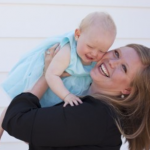Attention Family Caregivers: Let’s Put on Our Own Oxygen Mask First
September 30, 2014
By: Jamie Penner
When you fly on an airplane the flight attendants faithfully conduct the safety demonstration prior to takeoff during which they announce: “Remember to put on your own oxygen mask before assisting others.” This makes perfect sense in the case of an airplane emergency.You can’t help anyone else if you can’t breathe yourself, right? Although we may not realize it or even think about it, this also makes perfect sense in our lives as caregivers.
I am speaking as a nurse and a researcher but also from personal experience as a family caregiver and from witnessing friends, family, and colleagues in the caregiving role. Perhaps you can relate to being plunged into the new and often unfamiliar territory of caregiving, feeling unprepared and unsure of where you are headed. In a whirlwind of thoughts and emotions, you need to learn new information and acquire new skills, navigate the healthcare system, negotiate new routines, juggle numerous competing demands, provide physical, emotional, and practical support to the one you are caring for, act as a coordinator and liaison, and cope with your own fears and worries.
Don’t get me wrong; there are many aspects of family caregiving that can be rewarding but it is not without stress and anxiety and it is normal for caregivers to experience a wide range of emotional responses and extreme fatigue. The problem is that there is an essential piece missing from this puzzle: you finding time to take care of and nurture yourself, 1) because you matter, and 2) so you actually have enough energy to give to others. We often think “I will deal with me later,” or we feel guilty taking time for ourselves, or we don’t know how to fit one more thing into our already over-extended schedules. We typically put ourselves last, until something reminds us that those airplane instructions to put on our own oxygen mask first apply to other real-life situations too, including (and dare I say, especially) caregiving. When we don’t take care of ourselves we risk burning out and getting sick ourselves. We don’t have anything left to give to anyone else and we cannot perform well in our caregiving role if we are running on empty. Finding time and energy for self-care can be a challenge, I know. Giving ourselves permission to take care of us is the first step.
As a doctoral student, I am interested in finding ways to help caregivers take care of themselves for their own health and well-being and so that they can continue to provide safe and effective care. One way of doing this is through physical activity, which has been shown to have a number of health benefits including helping people to ‘feel better’ and feel less fatigued.
I am conducting a pilot study to see if small amounts of physical activity help to alleviate feelings such as anxiety, tension, and fatigue and keep you healthy to continue providing care as long as you wish.
Don’t have time? Don’t like intense, structured exercise? Can’t be away from the person you are caring for?
Did you know:
Even short bouts (5-10 minutes) of light intensity physical activity can have health benefits.
You can do things that you enjoy such as going for a walk, stretching, or yard work.
It can be done at home and tailored to fit your circumstances, needs, interests, and abilities.
If you are interested in participating in a study in which you may receive coaching and support to do short bouts of self-selected activities in your home, please contact:
Jamie Penner, RN, BPE, MN, PhD(c)
McGill University
514-340-8222 ext. 3426
jamie.penner@mail.mcgill.ca
Let’s remember to put on our own oxygen masks first…




